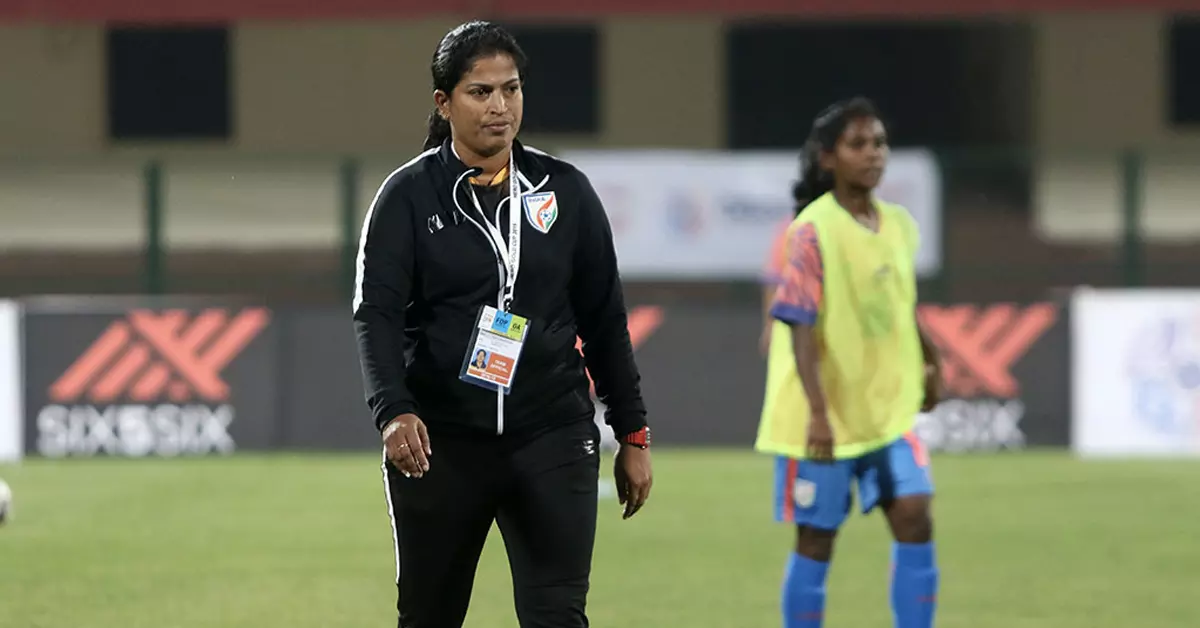Others
4 out of 64 — Where are the women coaches in Indian national teams?
There are only 4 women coaches of Indian national teams out of the 64 events associated.

Maymol Rocky - Coach of Indian women's football team (Source: AIFF)
The 2020 Summer Olympics will award medals across 339 events, representing 33 different sports. While India gears up for the delayed Olympics with the qualification process still on, the majority of the players who will take part in the Tokyo Olympics, will have male coach representatives. The Bridge analysed the coaching structure of 27 major sports played in the country and 64 events associated with them and found out the number of women coaches are restricted to just four.
The two woman coaches India will be counting upon in the Olympics are Deepali Deshpande, the high-performance coach of men's and women's rifle shooting team and Galina Bukharina, the coach for India's 400m relay team in Athletics. Apart from the aforementioned names, the other two women involved in the coaching of Indian teams are Maymol Rocky, who trains the Indian women's football team and Sunil Dabas of the Indian women's kabaddi team.
Galina Bukharina, the coach for India's 400m relay team in Athletics (Source: The Indian Express)
At a time when India's female sportspersons are leading by example with their mettle in the field of sports, the country doesn't have the numbers to show when it comes to women coaching strength. In 1896, the founder of modern Olympics games, Pierre de Coubertin had described women's sport as 'the most unaesthetic sight human eyes could contemplate. He had also advised that some of the events be reserved only for women.
According to a survey report by IOC published in 2016, it was found that almost half of National Olympic Committees had fewer than 20 per cent of women on their Executive Boards.
In a male-dominated country like India, women bear the socio-cultural burden passed on through generations. Despite women excelling as players in the country, we barely see women in authoritative bodies.
India witnessed its women power at Rio when Sakshi Malik and PV Sindhu were the only medal winners. At Gold Coast Commonwealth Games in 2018, out of the 221 athletes who participated, 46% of them were women, and almost 42% of the medals won were by women. But out of the other officials, there was barely any woman.
India still has a long way to go when it comes to producing women in coaching and supporting staff roles. One of the biggest factors could be a lack of awareness and opportunity. While there is a systematic approach to guide women in their transition of sports, nobody has the clarity on exact procedures to follow if they want to pursue coaching and training.
Another aspect often discussed is that women coaches are said to be less aggressive and demanding as compared to their male counterparts, and there is a psychological hindrance among men to be embarrassed being trained by women.
Female kabaddi coach Sunil Dabas (Source: IndiaTV)
The other reason one could ascribe is the rampant cases of sexual harassment which often remain unreported. Young female athletes who travel across the country to participate in tournaments are always vulnerable to such incidents. Unfortunately, most women coaches or managers are sent purely for security reason of female athletes and not for their better managerial skills.
Particular laws have been passed in other countries, for example, the Title IX of Educational Amendments was adopted in 1976 in the United States, which prohibited sex discrimination in the field of education or athletics. The law has been a device to empower women. India probably also need such laws to encourage more women representation among coaches and supporting staff.
The encouragement levels in India is pretty low. Once a woman takes retirement from their playing career, they are given responsibilities like taking care of their families, raise children, which serve as a roadblock for their future pursuits. This is not only the example seen in India but also across the world, though the number is few. 43-year-old Corinne Diacre is a French professional football coach and former football defender who is the manager of the second division French club Clermont Foot 63, and she is the only female manager in the higher leagues of Europe.
The change is slowly taking place in the Indian sports ecosystem but the road is pretty long. The good news is that there are many women sportspersons excelling as coaches and it is increasingly hard to overlook them.
